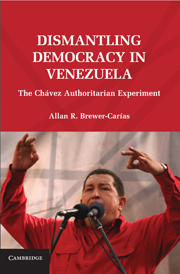Book contents
- Frontmatter
- Contents
- AUTHOR'S NOTE
- INTRODUCTION DEFRAUDING DEMOCRACY THROUGH NONCONSENSUAL CONSTITUENT ASSEMBLIES
- PART ONE THE POLITICAL ASSAULT ON STATE POWERS AND THE FRAMEWORK FOR AUTHORITARIANISM
- PART TWO INSTITUTIONAL DEVELOPMENT TOWARD CONSOLIDATING AUTHORITARIANISM
- PART THREE CONSTITUTIONAL REFORMS DESIGNED TO CONSOLIDATE AUTHORITARIANISM
- Chapter 10 THE FAILED ATTEMPT TO CONSOLIDATE AN AUTHORITARIAN AND ANTIDEMOCRATIC POLITICAL SYSTEM IN THE CONSTITUTION
- Chapter 11 THE FAILED ATTEMPT TO CONSOLIDATE A CENTRALIZED STATE IN THE CONSTITUTION
- Chapter 12 THE FAILED ATTEMPT TO CONSOLIDATE A SOCIALIST CENTRALIZED ECONOMIC SYSTEM IN THE CONSTITUTION
- Chapter 13 THE IRREGULAR FRAUDULENT IMPLEMENTATION OF THE REJECTED CONSTITUTIONAL REFORM THROUGH LEGISLATION
- Chapter 14 THE ILLEGITIMATE MUTATION OF THE CONSTITUTION THROUGH JUDICIAL CONSTITUTIONAL INTERPRETATION
- Chapter 15 THE ALTERNATE PRINCIPLE OF GOVERNMENT AND THE 2009 CONSTITUTIONAL AMENDMENT ON CONTINUOUS REELECTION
- FINAL REFLECTIONS: THE RIGHT TO DEMOCRACY AND ITS VIOLATION BY VENEZUELA'S AUTHORITARIAN GOVERNMENT: SOME RELEVANT FACTS FROM THE PAST DECADE
- INDEX
Chapter 11 - THE FAILED ATTEMPT TO CONSOLIDATE A CENTRALIZED STATE IN THE CONSTITUTION
Published online by Cambridge University Press: 05 June 2012
- Frontmatter
- Contents
- AUTHOR'S NOTE
- INTRODUCTION DEFRAUDING DEMOCRACY THROUGH NONCONSENSUAL CONSTITUENT ASSEMBLIES
- PART ONE THE POLITICAL ASSAULT ON STATE POWERS AND THE FRAMEWORK FOR AUTHORITARIANISM
- PART TWO INSTITUTIONAL DEVELOPMENT TOWARD CONSOLIDATING AUTHORITARIANISM
- PART THREE CONSTITUTIONAL REFORMS DESIGNED TO CONSOLIDATE AUTHORITARIANISM
- Chapter 10 THE FAILED ATTEMPT TO CONSOLIDATE AN AUTHORITARIAN AND ANTIDEMOCRATIC POLITICAL SYSTEM IN THE CONSTITUTION
- Chapter 11 THE FAILED ATTEMPT TO CONSOLIDATE A CENTRALIZED STATE IN THE CONSTITUTION
- Chapter 12 THE FAILED ATTEMPT TO CONSOLIDATE A SOCIALIST CENTRALIZED ECONOMIC SYSTEM IN THE CONSTITUTION
- Chapter 13 THE IRREGULAR FRAUDULENT IMPLEMENTATION OF THE REJECTED CONSTITUTIONAL REFORM THROUGH LEGISLATION
- Chapter 14 THE ILLEGITIMATE MUTATION OF THE CONSTITUTION THROUGH JUDICIAL CONSTITUTIONAL INTERPRETATION
- Chapter 15 THE ALTERNATE PRINCIPLE OF GOVERNMENT AND THE 2009 CONSTITUTIONAL AMENDMENT ON CONTINUOUS REELECTION
- FINAL REFLECTIONS: THE RIGHT TO DEMOCRACY AND ITS VIOLATION BY VENEZUELA'S AUTHORITARIAN GOVERNMENT: SOME RELEVANT FACTS FROM THE PAST DECADE
- INDEX
Summary
In addition to consolidating an authoritarian and nondemocratic state in the Constitution, the rejected 2007 constitutional reform sanctioned by the National Assembly, also sought to consolidate a centralized state in the Constitution in complete substitution of the federation.
PROPOSED CHANGES IN THE STATE FORM: FROM CENTRALIZED FEDERATION TO CENTRALIZED STATE
From the time the Republic of Venezuela was established in 1811, and from when it was subsequently reconstituted in 1830, the Venezuelan state, in formal terms, has always been that of a federation – a state whose public powers are distributed between autonomous political-territorial entities on three levels: national (republic), state (individual states), and municipal (municipalities). The respective autonomies of each level have been constitutionally guaranteed.
Despite its vicissitudes and a tendency toward centralization, the Venezuelan federation has implied a vertical distribution of the public powers. Although it is not expressly eliminated in formal terms, the 2007 reform was to result in the disappearance of the federation. This was to perpetrate fraud on the Constitution.
The Destruction of the Federation
Taking Away Territoriality from the Federation
Although the 2007 reform did not expressly propose eliminating the federal form, its content was designed to eliminate the federation. With respect to the states and municipalities (Article 16 of the Constitution of 1999), on which the concept of federalism is built, the 2007 reform sought to eliminate the constitutional guarantee of municipal autonomy and political-administrative decentralization, thus laying the groundwork to remove any jurisdictional competencies and power from those territorial entities.
- Type
- Chapter
- Information
- Dismantling Democracy in VenezuelaThe Chávez Authoritarian Experiment, pp. 291 - 310Publisher: Cambridge University PressPrint publication year: 2010



